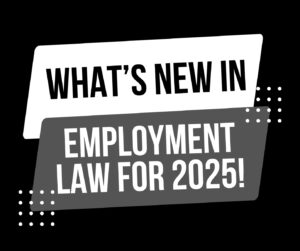Each year, the legislature passes a bevy of new laws that impact our practice. The labor and employment arena is no exception, as that landscape is undergoing significant changes in 2025. There are new laws affecting workplace rights, compensation, employee protections, and of course, what would a new year be without more PAGA reforms? Here’s some of the highlights of what you should know about these new laws.
Worker Protection Against Intimidation – The California Worker Freedom from Employer Intimidation Act (SB 399) introduces crucial workplace protections. Under this new legislation, employers cannot mandate employee attendance at meetings discussing the employer’s political or religious views. Violations carry significant consequences, including civil penalties of $500 per employee per violation. Additionally, employees may pursue legal action for damages, including punitive damages, if they face discrimination or retaliation for refusing to attend such meetings.
Enhanced Paid Family Leave Benefits – AB 2123 marks a significant shift in California’s Paid Family Leave (PFL) policy. Starting with the new year, employers can no longer require employees to exhaust their paid time off (PTO) before accessing PFL benefits. This change streamlines access to PFL for employees needed time off to care for seriously ill family members, bond with new children, or support military family members on active duty. This modification ensures employees can preserve their personal time off while utilizing state-provided family leave benefits.
Expanded Protections for Violence Victims – AB 2499 broadens workplace protections for victims of violence, which encompass incidents such as domestic violence, sexual assault, stalking, and other violent crimes involving bodily injury, death, or threats. The law provides paid time off regardless of whether an arrest or conviction has occurred and extends protection to employees caring for affected family members. The law defines family members broadly, and includes children, parents, grandparents, grandchildren, siblings, spouses, domestic partners, and other designated persons.
Compensation Updates – California continues its commitment to fair wages with several important changes. The standard minimum wage will increase to $16.50 per hour, applying to all employers regardless of size, while the minimum annual salary to qualify as an “exempt employee” increases to $68,640. It should be noted that local jurisdictions may maintain higher minimum wage requirements through living wage ordinances.
PAGA Reform Implementation – The Private Attorneys General Act (PAGA) continues to generate a good deal of tension between labor and management. In fact, Governor Newsom brokered a deal that significantly reformed the law in exchange for removing a proposed initiative from the ballot that would have done away with PAGA altogether. The result is an amended statute that, in my opinion, does a pretty good job of balancing employee rights with legitimate employer interests. Some of the more important reforms are: a provision which requires that plaintiffs must personally experience violations in order to bring a claim; allowing courts more discretion to manage the trial of an action, without wholesale dismissing it; providing employers expanded opportunities to remedy violations without incurring substantial fines or penalties; and allowing large employers to stay a case and request an “early evaluation” of the case before a neutral evaluator. This particular part of the law is not very well defined, and clearly there will be significant growing pains in exactly how this will play out in practice, but overall, these reforms should help cut down significantly on frivolous cases while still protecting employees from real and harmful violations of law. Practitioners should obviously familiarize themselves with all the details of the new statutory scheme, as the above is just some of the basic highlights.
Never a dull moment in the Labor and Employment arena, that’s for sure.
Happy New Year! – Drew











